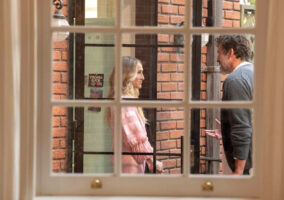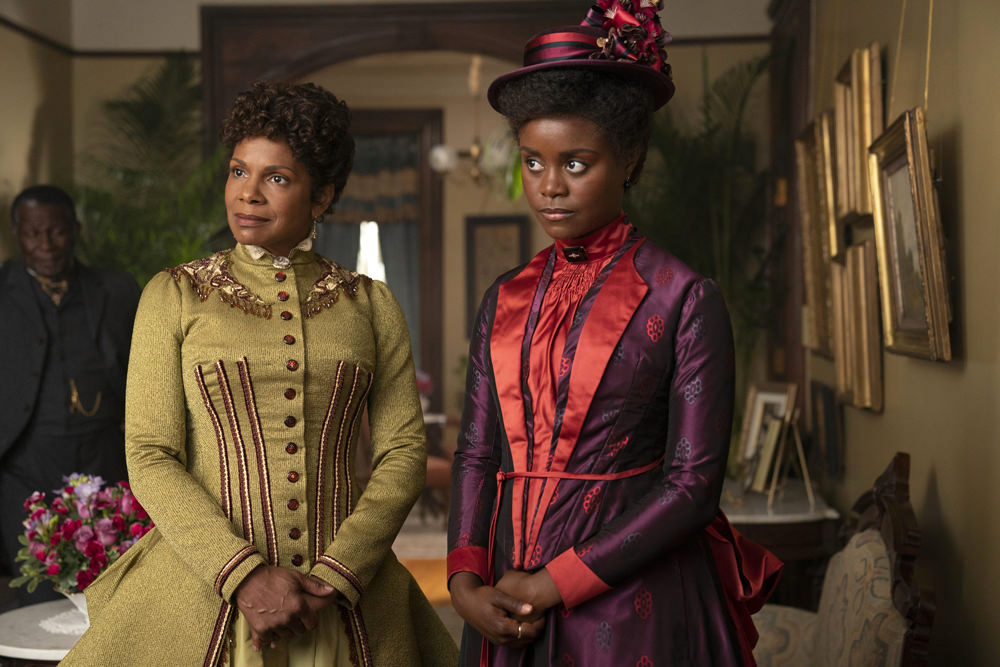
Things are looking pretty rosy for a lot of folks at 61st and Fifth this episode. Granted, the uber-wealthy of the Gilded Age generally had the best shots in history for a rosy life, but right now, the Russells are climbing that ladder, Peggy’s got an entire career blossoming in front of her, and Marian is quite taken with Mr. Raikes and his sudden marriage proposal. Yes, the future’s looking bright for a lot of folks on the Upper East Side, except if you’re a saucy ladies maid, a former mistress, Pumpkin the dog, or just died by suicide.
Patrick Morris gets lowered into the ground just as George Russell gloats over his new train station plans, which tells us that our prediction of last week is not likely to come true. We figured the Russells would be shunned even more by the old crowd for their parts in humiliating the Morrisons, but it seems the actual suicide is the greater scandal for this crowd. George takes a moment from gloating in order to feel a little badly about it, but Bertha lowers the temperature on her heart by several degrees and coolly informs him, “You are strong, he is weak. Who’s to blame for that?” We had no reason to expect such a cutthroat, Game of Thrones-esque take on the Gilded Age from the creator of Downton Abbey, but we’re pleasantly surprised that Julian Fellowes is going this route and we wonder how much his co-creator Sonja Warfield has to do with that. We suspect she also has quite a bit to do with the series rather refreshing focus on the Black Elite of New York society, which is not exactly a corner of history that gets over-represented in stories from this period.
Anyway, George goes to see Charles Fane and more or less extends an olive branch to him. “We behaved badly and you punished us, which is fair enough,” Fane replies, somewhat unconvincingly. Some sort of deal is struck or job is offered, because the next thing we see, Charles is berating his wife into being nicer to Bertha Russell and finding some way to get her accepted into high society. “She’s no more excluded than a dozen women I can think of, she just isn’t included,” Aurora offers, as if snobbery was a thing that excuses itself simply by propagating. “You overestimate my power,” she tries, but he won’t have it. “I’d like us not to be paupers!” Also something-something about relying on her father for their money, which she slaps down rather quickly. There’s a little more story to the Fane marriage.
Bertha tries to act cool at the news that Aurora will be calling on her and hopes it won’t be one of those dreary affairs where some woman begs for her mercy. Aurora does a much better job of kissing Bertha’s ring than Ann Morris did, although Bertha doesn’t give her an inch to breathe during their meeting. Aurora suggests a luncheon with Ward McCallister (the man who coined the term “The Four Hundred), who helps Mrs. Astor “with her work shaping society,” as Aurora puts it.
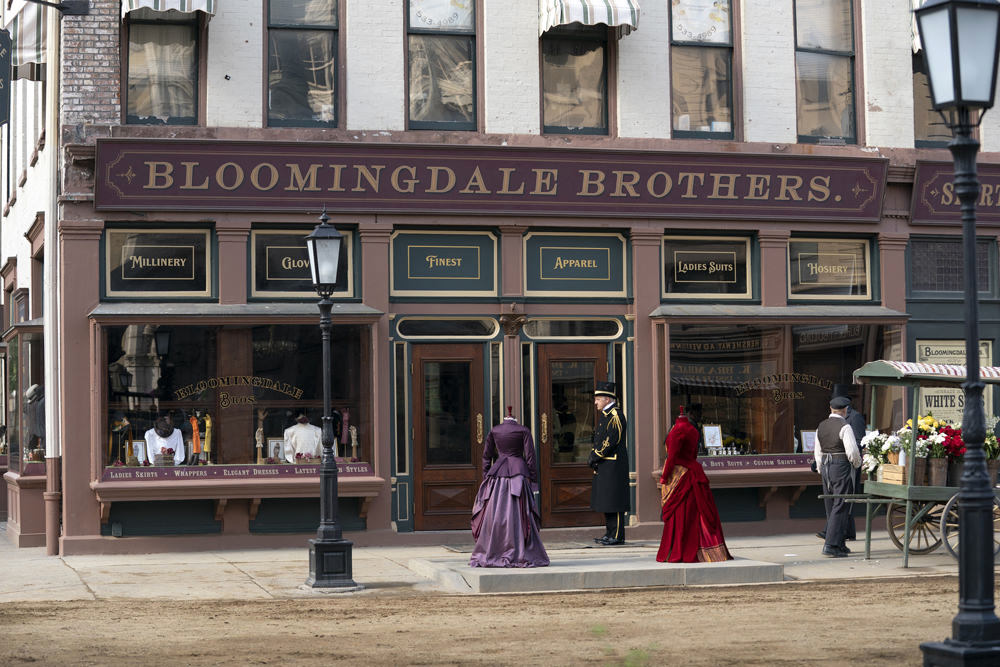
Meanwhile, Marian and Peggy walk the curiously shit-free streets of New York discussing their lives. Peggy has a new job prospect and Marian doesn’t know how to feel about Mr. Raikes and his proposal. She is delighted by the newfangled Bloomingdales and decides she wants to go in. “Why?” a practical-minded Peggy asks. “Do you need something?” Marian, never once thinking of what it might be like for Peggy to be dragged into a store like that, barges on in, expecting to be followed. This is not the last of her Karening this episode. She is met by the scandal-ridden Mrs. Chamberlain, who shows her a rather garish and heavy carved box she just purchased that may or may not be the work of Grinling Gibbons, she name-drops. When the prissy store manager comes over to sneer at Peggy, Mrs. Chamberlain sizes up the situation and invites her into the conversation, for which Peggy is grateful. This is of a piece with how the show is portraying the racism that dominated this period; by largely letting upper class people be seen as more interested in class than race.
Peggy has a meeting with T. Thomas Fortune, the editor of The New York Globe, although it’s more of a classic meet-cute really. She helps him with the printing press and then listens to him argue about Republicans and their shortcomings, Lincoln included, to which Peggy drops the bomb “Why should I align myself with either party when I don’t have the right to vote?” He offers her a job on the spot.
“I haven’t been thrilled since 1865,” says Agnes when she overhears that Peggy has good news. The Civil War keeps getting referenced over and over again this episode. She is nonetheless pleased to hear of Peggy’s success and grants her the time off to go see her parents, with the gentle admonition that she not tell them that she’ll be writing about politics. “They don’t want any trouble more than I do,” she clucks. So far, the only real racism in the series is coming from the servant or working classes, while Fellowes and Warfield give the upper class people a sense of largesse that isn’t exactly historically accurate.
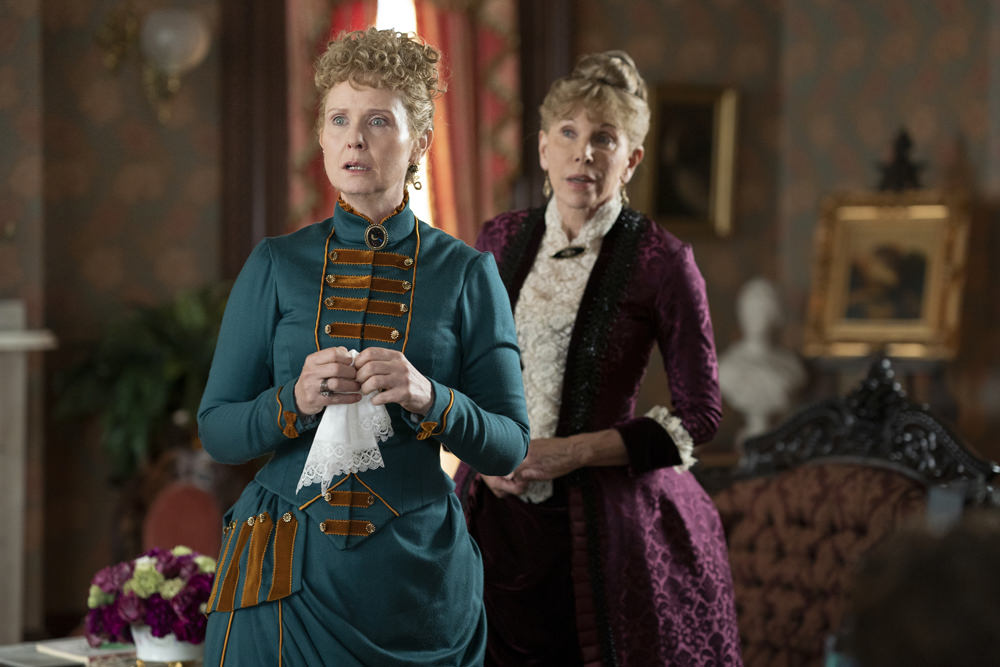
Across the street, Bertha is firing the governess, not because it’s time for Gladys to grow up, but because she feels she’s lost control over her. The mostly unseen-till-now governess decides to get a few words in to the effect that she’s doing Gladys real harm by treating her like a child. “Presumably you speak in such a manner because you know you’ve lost your position,” Bertha replies coolly. Bertha never not replies coolly. Anyway, our prediction now is that poor Gladys is either going to run off with some man or get pregnant by him, because that’s how Fellowes rolls. In other news, George is worried about railroad disasters affecting his bottom line and Bertha, fresh from her invite to a Red Cross benefit at the Academy of Music, suggests they get behind Clara Barton’s endeavor, thereby inventing public relations on the spot. George likes the optics of it and decides to buy Bertha’s way onto the board, although she doubts it’s possible since Ann Morris sits on it already. While the old money people probably would have found this open mercenary behavior to be distasteful, it’s still admirably shrewd of the Russells in a darkly ambitious kind of way. You’ve got to admire their sense of devotion and teamwork.
Bannister loses Pumpkin, which causes Ada to collapse into high corseted hysterics and Agnes to take her sneering to DEFCON 1. “You survived a civil war and yet you collapse because a lap dog is missing!” We suspect Agnes works “You survived a civil war” into her criticisms of people quite often. “You survived a civil war and yet you misplaced your gloves!” “You survived a civil war and yet your handwriting is atrocious!” You’ve got to admit, it’s hard to rebut once the Civil War is brought up.
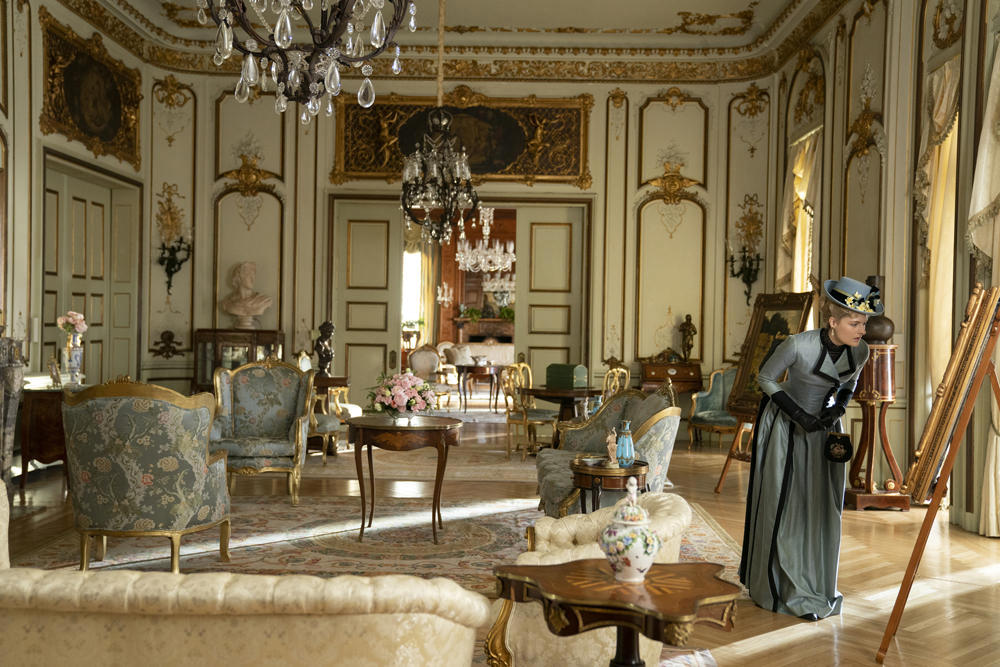
Mrs. Chamberlain has the ornately carved box delivered to Marian, knowing that she will be forced to return it. Agnes demands to know who sent it and Marian opts to get rid of it rather than tell her. “Aunt Agnes I can’t make vague promises about unforeseen circumstances in an unknown future,” she says vaguely. Marian never not says things vaguely. Agnes worries that they don’t even really know their plucky, headstrong, curiously under-emotive niece. Ada has another bout of corseted near-hysterics when Marian tells her who the box came from. “To spend time with her is to be contaminated!” she blurts out histrionically. She tries to get Marian to promise to marry a gentleman, to which the little smartass would only promise to marry “a gentle man.” She then goes on to offend Ada by suggesting she’s some sort of tragic figure for not having married. “Even I know that marrying beneath oneself is no guarantee of happiness,” Ada sniffs corsetedly.
Marian returns the box to Mrs. Chamberlain at her palace, pokes at her to get a little bit of background on her life, and admires her impressive art collection. Meanwhile, Oscar, like all gay cousins, has the hot goss on Mrs. Chamberlain and spills it in a way Ada couldn’t. Evidently she was Mr. Chamberlain’s mistress for many years until his first wife died, having a child with him long before they married and passing him off as an adoption to a disbelieving high society in Manhattan. Marian asks Ada if it’s true, to which she replies somewhat mysteriously “People think it’s true.”
The Russell servants rescue Pumpkin and Bertha, possibly (but probably not) seeing it as an opportunity, tells the servants to feed it and bathe it while she sends a note across the street. Agnes is livid at the news and accuses her of kidnapping it. “She wants to force us to receive her!” Here’s the thing about that, though: We keep pointing this out, but Bertha truly doesn’t appear to be all that interested in Agnes van Rhijn, her son, her sister, or even her niece. She has been coolly polite to them when she sees them, but despite Agnes’ insistence otherwise, seems to have no desire to be received across the street. She’s got her sights on Mrs. Astor. Agnes sends Bannister to fetch Pumpkin and, in that way where loyal servants are as snobbish as their employers that Fellowes likes to point out often, he uses the opportunity to be a passive-agressive bitch about pretty much everything he sees, from the menu to the place settings. “Heavens, chicken soup for luncheon!” “We think of it as more of a nursery dish.” “I have been transported to Versailles!” “Colored glasses! How festive.” “It is always so very interesting to learn how different people manage things.” Church, the Russell butler, is nervous that he’s doing it the wrong way and makes it his business to find out how Mrs Astor sets the table. Turner sneers. “Pfft. She won’t be coming to dine” before announcing “I’m wasting my life here” and stomping out. The French chef politely listens to her and tells her to fuck off, but only in his head.
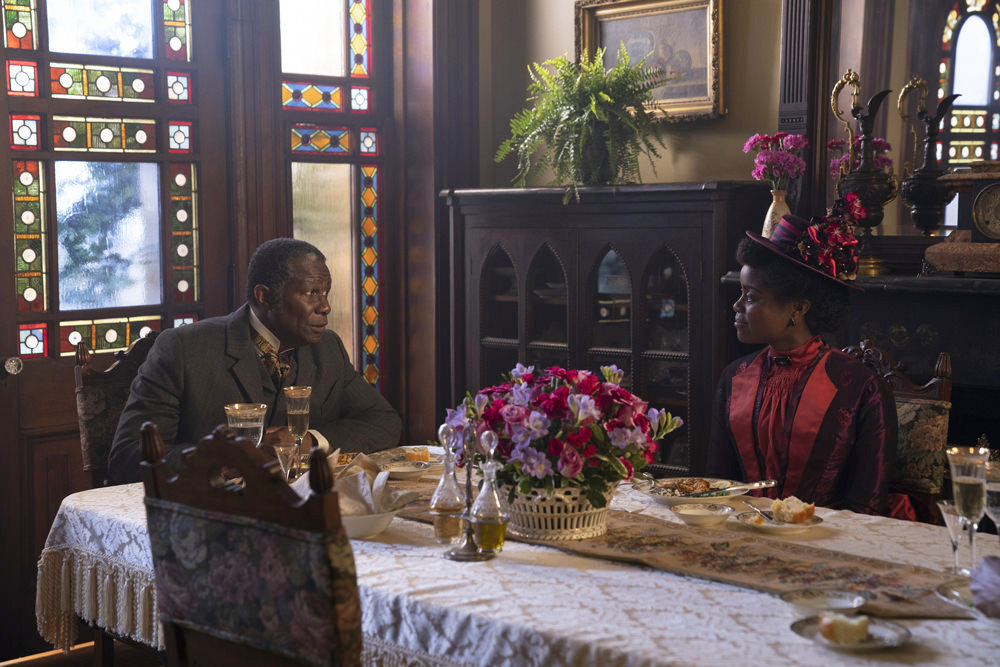
There was other servant drama, but it feels a bit perfunctory. Watson the valet goes to stare a bit creepily at some lady. Bridget the kitchen maid tells Mrs. Bauer about the sexual abuse she suffered at home. And Turner gets WAY out ahead of her skis, nakedly (literally) promising to be George’s “sanctuary” and a temple to his greatness. While we rolled our eyes at the silliness of George calmly asking her to leave and letting her keep her job, we were too distracted looking at his chest to wonder about it for too long. Sorry to make the comparison yet again, but this is just like Downton Abbey, where the servants could almost literally get away with murder and still keep their jobs.
Peggy finally visits her parents at their gorgeous house in Brooklyn, but the luncheon is tense, despite Peggy’s father telling a cute story about a beloved uncle’s annoying eating habits. He ends the story by mentioning that he got sold away, which is treated matter-of-factly. As we said, the Civil War – and by extension of course, slavery – is suddenly being referenced quite a bit in the script. This isn’t a criticism, however. It enriches the story and reminds you that literally everyone in it lived through the worst period in American history while the worst legacy of the American experiment threatened to tear the young country apart. Of course everyone would still be mentioning it. They’re all closer to it than we are to 9/11. Anyway, Marian sticks her big, white, under-emotive face into the middle of things and only manages to embarrass herself. We’d have liked it if a giant hole opened up and swallowed her for being so stupid as to show up at a Black family’s house with castoff shoes, but it was a welcome scene nonetheless. Fellowes and Warfield insist on having the upper classes be largely unconcerned with matters of race, but this was a wonderful reminder of how clueless even the most benign of them could be. Peggy was right to remind her that not only are they not friends, they can’t ever be friends.
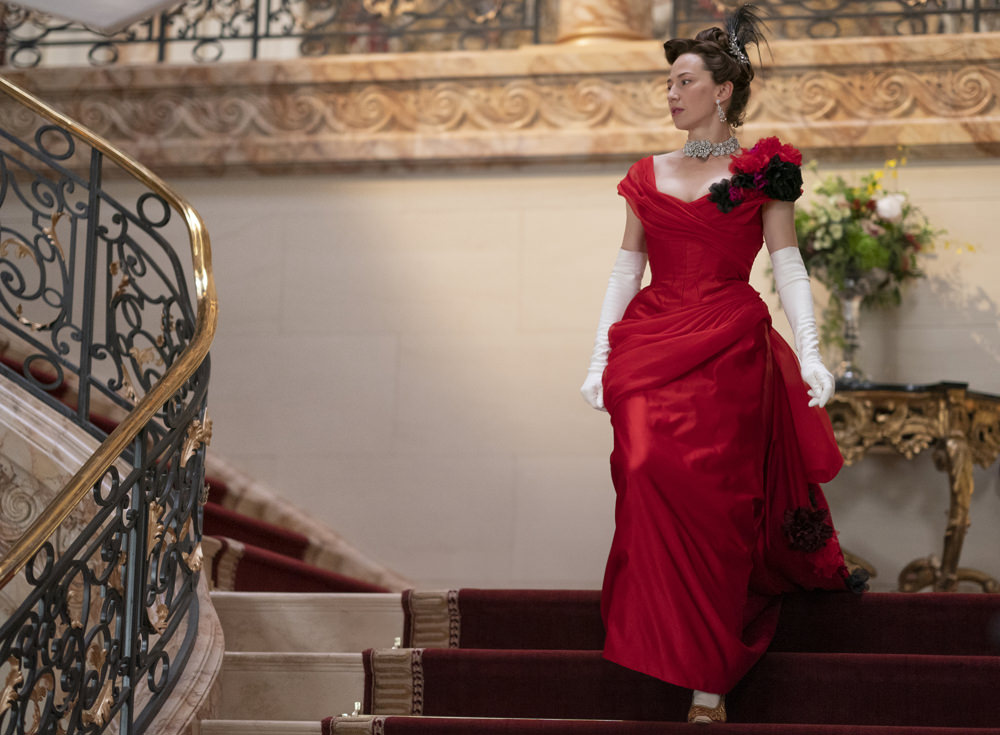
Marian recovers from this faux pas in the way only a privileged white girl can, by putting on a gown and flirting with a cute man at the orchestra while pretending it never happened. She is seated with the Fanes and the newly ascendent Bertha, who shows up in her most stunning dress yet. As we’ve said before, she’s at Victorian Kardashian levels of image management here. You could tell how much her appearance meant to her as she strode out to her carriage in that jaw-dropping red cloak. She uses her fashion to impress and to dominate. Mr. Raikes stops by their box and the Fanes exchange knowing glances because they can spot a climber when they see one. Marian is charmed, however, and never once considers that her would-be beloved is acting more like a gigolo than a potential husband. She sighs and rests her curiously unemotive face in her hands as she listens to the orchestra.
[Photo Credit: Alison Cohen Rosa/HBO]
Florence Pugh for J. Crew’s Spring 2022 Ad Campaign Next Post:
AND JUST LIKE THAT Star Sarah Jessica Parker Lights Up the Empire State Building Tiffany Blue
Please review our Community Guidelines before posting a comment. Thank you!



